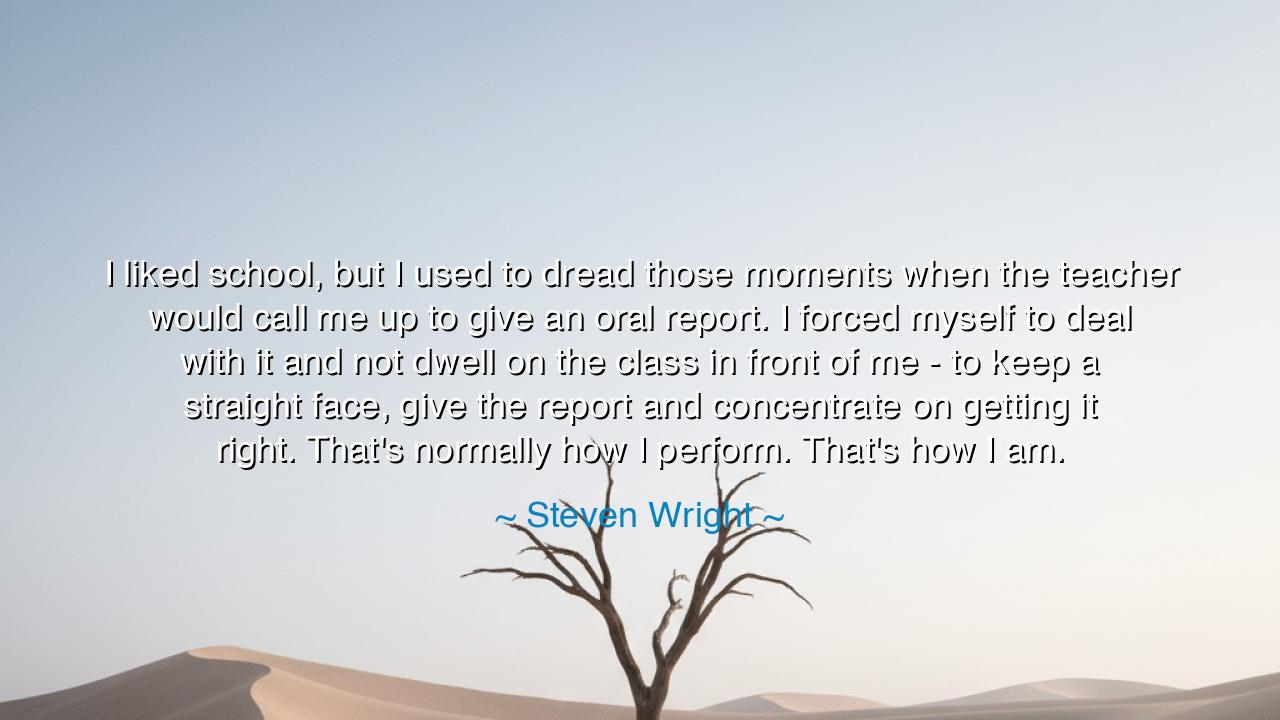
I liked school, but I used to dread those moments when the
I liked school, but I used to dread those moments when the teacher would call me up to give an oral report. I forced myself to deal with it and not dwell on the class in front of me - to keep a straight face, give the report and concentrate on getting it right. That's normally how I perform. That's how I am.






The words of Steven Wright—“I liked school, but I used to dread those moments when the teacher would call me up to give an oral report. I forced myself to deal with it and not dwell on the class in front of me - to keep a straight face, give the report and concentrate on getting it right. That's normally how I perform. That's how I am”—speak to the hidden battles that dwell within the hearts of so many. They remind us that fear, especially the fear of standing exposed before others, is one of the oldest struggles of humankind. Yet they also teach us that true strength is not the absence of fear, but the ability to act in spite of it, to hold steady, and to keep the face unshaken while the storm rages within.
The origin of Wright’s reflection lies in the simple yet profound experience of the classroom. A teacher calling a student to the front may seem a small matter, but to the soul of a shy or self-conscious child, it is a moment of trial, a mountain to be climbed. In such a moment, the young Wright discovered his method: not to be overwhelmed by the gaze of the many, but to narrow his focus, to concentrate on the task, to perform as best he could. What he learned in the classroom became not merely a strategy for school, but a truth about his very character—"That’s how I am."
History provides us with a mirror of this truth. Consider Demosthenes, the great orator of ancient Athens, who as a boy was mocked for his weak voice and awkward delivery. He dreaded the act of public speaking, just as Wright dreaded the oral report. Yet Demosthenes forced himself to confront the trial. He practiced with pebbles in his mouth, he spoke above the crashing waves of the sea, he disciplined his body and his mind until the weakness became his strength. His eloquence would one day move nations. In both Demosthenes and Wright we see the same principle: greatness begins not with ease, but with the courage to endure discomfort.
The emotional depth of Wright’s words lies in the universality of his struggle. Who among us has not feared exposure? Who has not stood trembling before the eyes of others, fearing failure or judgment? Yet Wright shows us the path forward: discipline, not surrender. He did not allow his dread to govern him. He did not flee from the task, nor hide behind excuses. Instead, he resolved to keep his composure, to give what was asked of him, and to concentrate on getting it right. This is the heart of perseverance: to do what must be done, even when the heart quivers.
There is something heroic in this. For the hero is not the one who feels no fear, but the one who acts rightly while afraid. Wright’s straight face, his determination to focus on the report rather than the watching class, is a quiet heroism. It is the heroism of the everyday, the courage that does not win medals but shapes character. And it is this hidden bravery that prepares a soul for greater trials ahead. In truth, every child called before a class, every worker asked to speak in a meeting, every leader who must stand before a crowd is tested in the same way: the test of self-command.
The lesson for us is plain: when dread rises, do not yield to it. Narrow your focus. Do not gaze upon the multitude, but upon the task. Do not waste strength on fear of what others think, but pour it into doing what is required. By this discipline, fear loses its teeth, and courage is born. Remember that even the most polished speaker, the most graceful performer, once stood as a trembling child before a classroom, learning to master themselves one moment at a time.
What, then, shall we do? Let us not flee from the trials that expose our weakness, but embrace them as the forge of strength. Let us practice composure in small things, so that we may stand steady in great things. Let us teach our children, and remind ourselves, that fear is not the end of the road, but the beginning of growth. And let us walk with the knowledge that, like Wright, we too may say: “That’s how I am”—not defined by fear, but by the courage to face it, and the discipline to endure.
Thus, his words endure as a beacon for all who tremble before the eyes of others. To dread is human, to act despite dread is noble, and to master oneself is victory. This is the quiet heroism that shapes destinies, the courage hidden in straight faces, and the strength that transforms dread into dignity.






AAdministratorAdministrator
Welcome, honored guests. Please leave a comment, we will respond soon